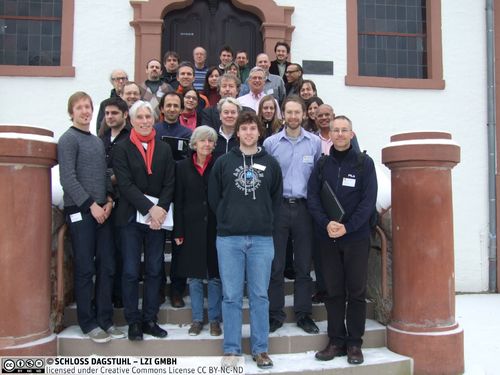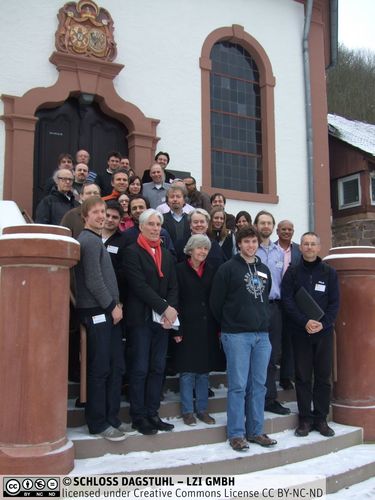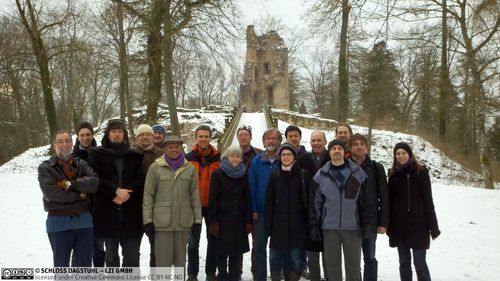Dagstuhl Seminar 13072
Mechanisms of Ongoing Development in Cognitive Robotics
( Feb 10 – Feb 15, 2013 )
Permalink
Organizers
- Jacqueline Fagard (Paris Descartes University, FR)
- Roderic A. Grupen (University of Massachusetts - Amherst, US)
- Frank Guerin (University of Aberdeen, GB)
- Norbert Krüger (University of Southern Denmark - Odense, DK)
Contact
- Annette Beyer (for administrative matters)
Shared Documents
- Dagstuhl Materials Page (Use personal credentials as created in DOOR to log in)
In cognitive robotics "ongoing development" refers to the ability to continuously build on what the system already knows, in an ongoing process, which acquires new skills and knowledge, and achieves more sophisticated levels of behavior. Human infants are possibly the best known demonstrators of this ability; developmental psychology has many results documenting what infants can and cannot do at various ages, however we know very little about the mechanisms underlying the development. On the robotics side, creating a computational system which displays ongoing development is still an unsolved problem. There are major unsolved questions regarding the mechanisms of ongoing development, in both biological and artificial systems; for example: how to transfer existing skills to a new context, how to build on existing skills, and how to represent knowledge (or skills).
The primary aim of the seminar is to bring together researchers from two communities (developmental robotics and infant developmental psychology) in order to spawn new collaborative research projects which will advance our scientific under- standing of the mechanisms underlying ongoing development (whether in infants or robots).
In order to achieve a greater depth in discussions, and to keep a concrete real-world focus, we intend to narrow the focus of the seminar somewhat: we will especially focus on perception, understanding and manipulation skills relating to physical objects in the world, and the skills which infants acquire in approximately the 4-24 months period. This period begins with infants executing actions on single objects (banging, scratching, squeezing), and ends with infants executing accommodative relational acts on object combinations, for example placing a peg in a hole, stacking blocks, standing a cylinder on its end, placing a lid on a jar, using a long stick or hook to retrieve a distant object, transporting food on a spoon. Infants at the end of this period have quite a robust repertoire of skills for manipulating physical objects, which is the result of a long developmental trajectory exhibiting ongoing developments which build on each other.
The following are core questions which will be discussed in this seminar:
- How is a state-space explored? Given a scenario with a certain number of degrees of Freedom (DOFs), how does the infant go about varying parameters (e.g. at low level of motor control, and high level of spatial relationships among objects)?
- What is the infant motivated to explore, and in what circumstances do they give up? (Giving up also tells us something about the intrinsic motivation.)
- How do infants learn new skills? (For example, one method could be by scaf-folding.)
- How do infants add these new skills to their motor repertoire?
- How is old knowledge transferred or re-used? Where do we see infants borrowing old sensorimotor routines; how do they adjust them to the new situation?
- How robust is the behavior? In other words, to what similar situations does the infant easily generalize (meaning they start to develop the beginning of abstract representations and concepts), and to what situations does she fail to generalize?
- What representation of objects, spatial relationships, actions, and effects might be in use?
Significant advances can be made on these questions if the appropriate experiments are carried out, but such experiments may be unlikely to be performed without interaction between psychologists and computer scientists.
In cognitive robotics "ongoing development" refers to the ability to continuously build on what the system already knows, in an ongoing process, which acquires new skills and knowledge, and achieves more sophisticated levels of behaviour. Human infants are possibly the best known demonstrators of this ability; developmental psychology has many results documenting what infants can and cannot do at various ages, however we know very little about the mechanisms underlying the development. On the robotics side, creating a computational system which displays ongoing development is still an unsolved problem. There are major unsolved questions regarding the mechanisms of ongoing development, in both biological and artificial systems; for example: how to transfer existing skills to a new context, how to build on existing skills, and how to represent knowledge (or skills).
The primary aim of the seminar was to bring together researchers from two communities (developmental robotics and infant developmental psychology) in order to spawn new collaborative research projects which will advance our scientific understanding of the mechanisms underlying ongoing development (whether in infants or robots). We especially focused on perception, understanding and manipulation skills relating to physical objects in the world, and the skills which infants acquire in approximately the 4-24 months period.
Working groups were formed in the areas of (i) transfer of means/skills; (ii) motor skills/manipulation; (iii) concepts/representations; (iv) motivation; (v) visual perception. These discussed gaps between what infants and robots can do and what research might close the gap. In discussion groups the most significant issue that was raised (and discussed at length) was how to get psychologists and roboticists talking together and doing research together, as there seems to exist a wide gap between the communities. It was concluded that there was a need for psychologists to become computer scientists and computer scientists to become psychologists; i.e. that the meeting of the two fields would not happen simply by people getting together in a room, but that the meeting must happen inside individual heads. Furthermore challenge problems were posed by each of the two respective communities; challenges which they would like the other community to work on.
 Jacqueline Fagard, Roderic A. Grupen, Frank Guerin, and Norbert Krüger
Jacqueline Fagard, Roderic A. Grupen, Frank Guerin, and Norbert Krüger
- John Alexander (University of Aberdeen, GB) [dblp]
- Gianluca Baldassare (CNR - Rome, IT) [dblp]
- Emily W. Bushnell (Tufts University, US) [dblp]
- Paul R. Cohen (University of Arizona - Tucson, US) [dblp]
- Rana Esseily (University Paris Ouest - Nanterre, FR) [dblp]
- Jacqueline Fagard (Paris Descartes University, FR) [dblp]
- Severin Fichtl (University of Aberdeen, GB) [dblp]
- Roderic A. Grupen (University of Massachusetts - Amherst, US) [dblp]
- Beata Joanna Grzyb (Universitat Jaume I - Castellon de la Plana, ES) [dblp]
- Frank Guerin (University of Aberdeen, GB) [dblp]
- Verena V. Hafner (HU Berlin, DE) [dblp]
- Matej Hoffmann (Universität Zürich, CH) [dblp]
- Bipin Indurkhya (IIIT - Hyderabad, IN & AGH University of Science and Technology - Krakow, PL) [dblp]
- Sinan Kalkan (Middle East Technical University - Ankara, TR) [dblp]
- George Konidaris (MIT - Cambridge, US) [dblp]
- Norbert Krüger (University of Southern Denmark - Odense, DK) [dblp]
- Benjamin Kuipers (University of Michigan - Ann Arbor, US) [dblp]
- Ales Leonardis (University of Birmingham, GB) [dblp]
- Honghai Liu (University of Portsmouth, GB) [dblp]
- Jeffrey J. Lockman (Tulane University, US)
- Bärbel Mertsching (Universität Paderborn, DE) [dblp]
- J. Kevin O'Regan (Paris Descartes University, FR) [dblp]
- Mohamed Oubbati (Universität Ulm, DE) [dblp]
- Pierre-Yves Oudeyer (INRIA - Bordeaux, FR) [dblp]
- Justus Piater (Universität Innsbruck, AT) [dblp]
- Lauriane Rat-Fischer (Paris Descartes University, FR)
- Helge Ritter (Universität Bielefeld, DE) [dblp]
- Aaron Sloman (University of Birmingham, GB) [dblp]
- Georgi Stojanov (The American University of Paris, FR) [dblp]
- Alexander Stoytchev (Iowa State University, US) [dblp]
- Emre Ugur (ATR - Kyoto, JP) [dblp]
- Markus Vincze (TU Wien, AT) [dblp]
- Florentin Wörgötter (Universität Göttingen, DE) [dblp]
Classification
- artificial intelligence / robotics
- computer graphics / computer vision
- modelling / simulation
Keywords
- Developmental Robotics
- Developmental Psychology
- Sensorimotor Development




 Creative Commons BY 3.0 Unported license
Creative Commons BY 3.0 Unported license
